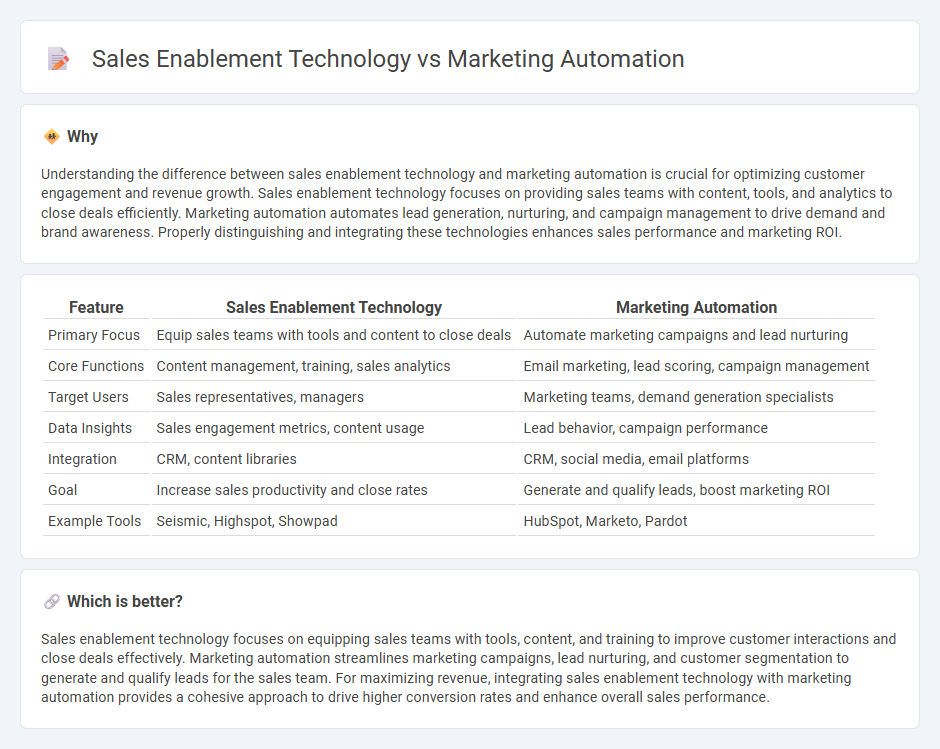
Sales enablement technology streamlines the sales process by providing teams with the right content, tools, and training to engage prospects effectively. Marketing automation focuses on nurturing leads through automated campaigns and personalized communications to drive demand generation. Explore how integrating sales enablement and marketing automation can boost revenue and improve customer engagement.
Why it is important
Understanding the difference between sales enablement technology and marketing automation is crucial for optimizing customer engagement and revenue growth. Sales enablement technology focuses on providing sales teams with content, tools, and analytics to close deals efficiently. Marketing automation automates lead generation, nurturing, and campaign management to drive demand and brand awareness. Properly distinguishing and integrating these technologies enhances sales performance and marketing ROI.
Comparison Table
| Feature | Sales Enablement Technology | Marketing Automation |
|---|---|---|
| Primary Focus | Equip sales teams with tools and content to close deals | Automate marketing campaigns and lead nurturing |
| Core Functions | Content management, training, sales analytics | Email marketing, lead scoring, campaign management |
| Target Users | Sales representatives, managers | Marketing teams, demand generation specialists |
| Data Insights | Sales engagement metrics, content usage | Lead behavior, campaign performance |
| Integration | CRM, content libraries | CRM, social media, email platforms |
| Goal | Increase sales productivity and close rates | Generate and qualify leads, boost marketing ROI |
| Example Tools | Seismic, Highspot, Showpad | HubSpot, Marketo, Pardot |
Which is better?
Sales enablement technology focuses on equipping sales teams with tools, content, and training to improve customer interactions and close deals effectively. Marketing automation streamlines marketing campaigns, lead nurturing, and customer segmentation to generate and qualify leads for the sales team. For maximizing revenue, integrating sales enablement technology with marketing automation provides a cohesive approach to drive higher conversion rates and enhance overall sales performance.
Connection
Sales enablement technology and marketing automation are interconnected through their shared goal of streamlining the buyer's journey and enhancing revenue growth. Marketing automation drives lead generation and nurtures prospects with personalized content, while sales enablement tools equip sales teams with relevant resources and insights to close deals effectively. This integration improves alignment between marketing and sales, increases conversion rates, and accelerates sales cycles.
Key Terms
Lead Scoring
Lead scoring is a critical component in both marketing automation and sales enablement technology, but their applications differ significantly. Marketing automation uses lead scoring to prioritize and nurture prospects through personalized campaigns based on behavioral data and engagement levels. Explore the nuances of how lead scoring enhances the effectiveness of marketing automation versus sales enablement technology.
Content Management
Marketing automation streamlines campaign execution through automated workflows, lead nurturing, and performance tracking, enhancing targeted content delivery. Sales enablement technology centralizes content management by providing sales teams with easy access to relevant materials, personalized templates, and real-time insights to improve customer interactions. Discover how integrating both can maximize content effectiveness and boost revenue by exploring the latest tools and strategies.
CRM Integration
Marketing automation platforms and sales enablement technology both heavily rely on CRM integration to streamline workflows and enhance customer interactions. Marketing automation tools sync with CRMs to deliver targeted campaigns based on customer data, while sales enablement solutions use CRM integration to provide real-time insights, personalized content, and communication tracking for sales teams. Explore the critical role of CRM integration in maximizing the impact of marketing automation and sales enablement technologies.
Source and External Links
What is marketing automation? - IBM - Marketing automation uses software to manage routine marketing tasks across multiple channels, helping organizations segment content and streamline customer experiences, often leveraging AI and machine learning for greater efficiency and ROI.
What is Marketing Automation? | Salesforce US - Marketing automation technology automatically handles marketing processes and campaigns across channels, sending personalized messages based on customer actions and saving time by reducing manual errors.
Marketing automation - Wikipedia - Marketing automation platforms automate repetitive marketing tasks, enabling more efficient lead generation, segmentation, nurturing, and ROI measurement, often integrated with CRM systems for a unified approach.
 dowidth.com
dowidth.com